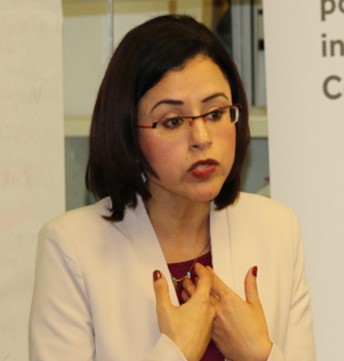
 Hadassah United Kingdom recently hosted Hadassah Medical Center Social Worker Lamis Shibli Ghadir for a talk about the “Multicultural Challenges of an Arab Social Worker in Israel.”
Hadassah United Kingdom recently hosted Hadassah Medical Center Social Worker Lamis Shibli Ghadir for a talk about the “Multicultural Challenges of an Arab Social Worker in Israel.”
Lamis is also a field instructor for social work students at the Hadassah-Hebrew University School of Social Work.
For Lamis, giving all her clients the best service is the priority, whatever the varying demands. Among her many diverse tasks is outreach to the Charedi and other religious communities to educate girls about the consequences of early pregnancy. Another is dealing with security issues when trying to bring patients from Gaza to Jerusalem for treatment. A typical day may involve coordinating with the army and/or being at a check-point to receive patients. These patients from Gaza, arriving with just one family member who often may not speak Hebrew, rely on Lamis to translate. A significant portion of the patients treated in Hadassah’s Pediatric Intensive Care Unit (PICU) only speak Arabic.
During her presentation for Hadassah UK, Lamis shared a case study of an ultra-orthodox woman who, on the heels of several terror attacks in Jerusalem, initially refused to share a room with other mothers who also wanted to be close to their sick children. “They are all Arabs in there,” she said, with fear.
After Lamis spoke with her and helped her realize that these were first and foremost mothers, like her, who were concerned only about their children’s illness and suffering, the woman agreed to share the room. And, as is typical within Hadassah’s walls, Lamis recalls, friendship began to grow across ethnic lines.
Another case Lamis recounted involved Yusif, a nine-year-old child from East Jerusalem, who had a life-threatening heart problem. Yusif’s treatment involved multiple heart operations and many weeks in Hadassah’s PICU while the Gaza war raged this summer. His mother, Fatma, had relatives in Gaza; she asked Lamis not to tell the staff, convinced that her child would be treated differently from the Jewish children. As it turned out, the mother built a warm rapport with the nurses, who brought Yusif gifts in celebration of his birthday. Fatma shared with Lamis her satisfaction that the problems of the Gaza war had not stood in the way of the staff’s professionalism. Moreover, Hadassah’s PICU staff members have become her friends.
For Lamis, these are but two stories out of hundreds. She conveyed, too, that Hadassah’s island of peaceful coexistence plays out poignantly in The Hadassah School, which gives long-term inpatients the chance to continue their education. It is a place where Arab children celebrate Ramadan alongside the Jewish patients, and the Jewish children teach their traditions to the Arab youngsters in return. Lamis relates that people often tell her they don’t believe this happens in Israel. She replies: “Come to the pediatric wing of Hadassah and you will see.”
